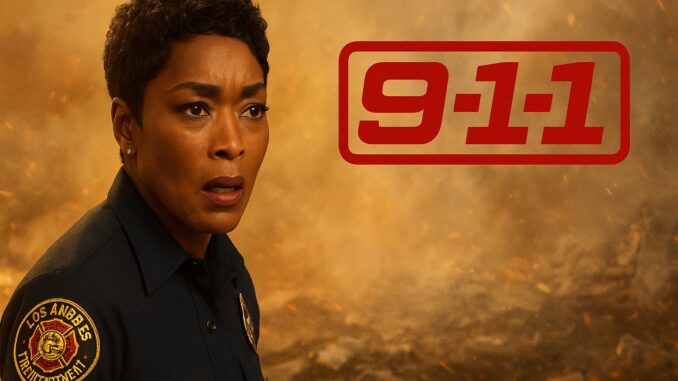
9-1-1 is now three episodes into its Season 9 opening emergency, and while this week’s episode is an improvement from last week’s, it unfortunately ends by dragging the space emergency out into a fourth episode. Season 9, Episode 3, “The Sky Is Falling” picks back up right after the Inara, the spacecraft carrying Hen (Aisha Hinds) and Athena (Angela Bassett), has caught fire. Athena puts the fire out by opening the emergency hatch, but when it comes loose, the passengers have a whole different problem: they’re now stuck in space with limited oxygen and no way home.
Back on the ground, Tripp Houser (Mark Consuelos) has given up on saving the passengers on the Inara – including his fiancée, Tricia (June Diane Raphael) – and he doesn’t seem all that broken up about it, either. Karen (Tracie Thoms) and Maddie (Jennifer Love Hewitt) are not willing to give up, though, so they work to gain contact with the Inara again to try to help them get home. It’s a fast-paced episode that also hits the right emotional beats, but it feels a little redundant that the emergency is going to continue for yet another episode next week.
Wow. Just when you think 9-1-1 has settled into a rhythm, Season 9 breaks one of its oldest traditions with Episode 3, titled “The Sky Is Falling.” This one didn’t just raise the stakes—it launched them into the stratosphere, quite literally. But here’s the twist: while the adrenaline was full throttle, watching the 118 navigate these new challenges made me question where the heart of the show really lies now. In this recap, I’ll walk you through what happened, how it diverged from the usual formula, who’s pushing the boundaries, and why I’m feeling torn. Let’s get into it.
What Went Down in “The Sky Is Falling”
A Storm Like No Other
Episode 3 opens with a geostorm raging over Los Angeles—a classic 9-1-1 scenario, but dialed to eleven. Debris is falling from the sky, and the 118 team is scrambling to save lives on the ground. It’s not your typical fire or medical call; this is something bigger, unpredictable, and terrifyingly beautiful. This isn’t just an emergency—it’s a natural disaster spectacle.
Athena & Hen’s Risky Mission
While chaos rules the ground, Athena (Angela Bassett) and Hen (Aisha Hinds) are in space. Yes, space. According to the official recap, they’re facing “increasing dangers in space” as their friends on Earth try to bring them home. This high-altitude storyline feels like a break from the down-to-earth rescues we usually get—and it’s bold.
Emotional Fallout on the Ground
Back with the 118 crew, the fallout from the geostorm isn’t just physical damage. There’s emotional tension. The team is stretched thin. Some feel they’re not prepared for this scale of emergency. Others are wrestling with grief and loss, especially since Bobby’s death in Season 8 looms large.
Why This Episode Feels So Different
Breaking Tradition
9-1-1 has always stuck to its roots: firefighters, paramedics, police, and dispatchers saving people in intensely personal, localized emergencies. But “The Sky Is Falling” flips that formula. It brings global-scale disaster + space danger + cosmic stakes. That’s not just mission creep—it’s a genre shift.
A Thematic Shift Toward the Big Picture
With space travel and geostorms, the show is no longer just about saving individual lives but potentially saving a city or more. That’s a thematic expansion that feels risky: can emotional character arcs stay grounded when your setting is outer space?
The Emotional Core Under Pressure
Athena and Hen’s space mission isn’t just physically perilous—it’s emotionally fraught. Their relationships back home are being tested. Meanwhile, the 118 team coping with the disaster on the ground are struggling with their own pain, and their ability to function under extreme stress is questioned. This episode makes it clear: leadership, grief, and heroism can collide in unpredictable ways.
Key Character Moments
Athena Grant Nash
Athena is no stranger to breaking barriers, but this mission feels personal. Her journey into space—or being stranded there—symbolizes how far she’s come and how much she’s willing to risk. Her strength is her anchor, but hope feels fragile when communication lines are stretched thin.
Hen Wilson
Hen’s presence in space alongside Athena shows how deeply the show trusts her narrative. She’s not a sidekick; she’s a partner in every sense. But being so far from home raises the question: what will it cost her, emotionally and physically?
The 118 Fire Team
On the ground, Chimney, Buck, Maddie, and the rest are thrown into chaos. The geostorm isn’t just debris—it’s a metaphor for the emotional debris they’re still working through. Their teamwork, trust, and resilience are pushed to the limit.
Themes & Symbolism
Sky vs. Ground — A Metaphor for Connection
The sky falling represents danger, but it’s also a metaphor for fractured connections. Athena and Hen drifting in space feel distant, both physically and emotionally, from their team and loved ones. Meanwhile, the 118 is trying to catch the pieces—and rebuild.
Grief in Motion
Bobby’s absence still casts a shadow. The geostorm and the space mission feel like external manifestations of the internal storm the team is navigating. The show uses high-stakes emergencies to mirror the high-stakes emotions.
Heroism Under Duress
This episode reminds us that heroism isn’t always calm, controlled, or predictable. Sometimes, it’s chaotic, fearful, and messy—and that’s where the real bravery lies.
Production & Direction Highlights
Cinematic Visuals
Visually, the episode leans into spectacle. The geostorm’s debris, the scenes in space, and the frantic ground rescues give it a cinematic feel, unlike the more grounded emergencies of earlier seasons.
Sound Design & Tension
The sound design amplifies the tension: wind howling, alarms blaring, communications crackling across space radios. It’s not subtle, but it’s effective. It elevates the episode from procedural to almost sci-fi thriller.
Writing & Pacing
The writing doesn’t slow down. There’s very little downtime. Each call, each moment in space, and each emotional beat carries weight. The pacing feels urgent—which fits, given what’s at stake.
How Fans Are Reacting
Mixed Feelings on Tradition vs. Innovation
Some fans are loving the ambition—this feels fresh, daring, and thrilling. Others are uneasy: is 9-1-1 still 9-1-1 when we’re dealing with geostorms and space missions?
Grief Is Still at the Core
For many long-time viewers, the emotional weight of Bobby’s death continues to be a major anchor. His absence is felt not just in grief, but in how every character is coping or failing to cope.
Conversations About the Future
Will this episode mark a turning point for 9-1-1? Is the show embracing bigger, more global crises? Will there be more “out of tradition” episodes? These are hot topics among the fandom right now.

Questions Raised by Episode 3
-
Is the series shifting genres? Are we still watching a first-responder procedural—or something bigger?
-
Can the emotional intimacy survive the spectacle? When characters are physically distant (like in space), can we still feel their bonds?
-
What does Bobby’s absence mean long-term? How much of the show will continue to revolve around loss, legacy, and leadership?
-
Will this scale of emergency become the new norm? Or was this a one-time event?
-
How will the 118 adapt? Who steps up, who breaks down, and who gets left behind?
My Take — Why I’m Torn
Honestly, I’m conflicted. On one hand, “The Sky Is Falling” is bold and visually spectacular—it’s a testament to how 9-1-1 is willing to push boundaries. That space storyline? Wild, but exciting. The geostorm on Earth? Terrifying, dramatic, and emotionally resonant.
But on the other hand, part of me misses the heart of the show: raw, human rescues. The kind where we see someone trapped in a building, or drowning, or in a car wreck—and the 118 pulls them out with sweat and tears. When everything becomes global-scale, there’s a risk that the emotional intimacy gets lost in the chaos.
So yes, I admire the ambition. I love that 9-1-1 is trying something new. But I also worry: if the show abandons its roots too much, will it lose the thing that made us care in the first place?
What This Means for Season 9 Going Forward
-
Bigger emergencies: Expect more large-scale disasters or unusual crises. The show is no longer staying small.
-
Character evolution: Athena, Hen, Buck, Maddie, Chimney, Eddie—they’re all likely to change. The grief, leadership void, and trauma arc runs deep.
-
Higher stakes: Not just personal stakes anymore. Now it’s about survival, as a city, as a team, maybe even as a family in space.
-
New direction: The traditional 9-1-1 formula may evolve—or fracture. This could be the beginning of a new era.
Conclusion
“The Sky Is Falling” isn’t just another 9-1-1 rescue story. It’s a bold pivot—and for a show that’s spent eight seasons grounded in urban emergencies, sending Athena and Hen into space and unleashing a geostorm on the 118 feels like a major leap.
It’s thrilling. It’s risky. And it’s emotionally messy. I’m not sure yet how I feel: exhilarated by the spectacle, but nostalgic for the firetruck rescues.
Still, one thing is clear: 9-1-1 Season 9 is not playing it safe—and that might make it one of the most interesting seasons yet.